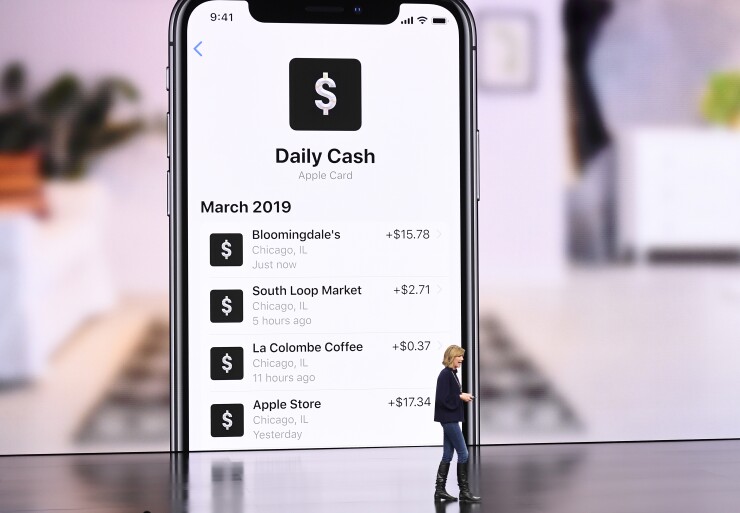Beyond Apple’s glitzy product rollouts this week, the tech giant quietly notified users of new policies and a fee to Apple Pay Cash, the account in which the
For the first time Apple is charging a 1 percent fee for Apple Pay Cash users to move funds instantly to a Visa debit account, and it’s adding the guarantee that funds will be available no later than 30 minutes. The pricing—and time promise—is in line with the Visa Direct debit-push service.
But the fee is also a point of friction that didn't previously exist in Apple Pay's ecosystem. The fee is small—no less than 0.25 percent to a maximum of $10—but could be significant in discouraging users from routinely draining their Apple Pay Cash accounts. Users have an alternative to move Apple Pay Cash funds to their bank account via ACH, and Apple reminded customers in this week's notification that it will take up to three days for those funds to arrive.

The new debit card transfer fee aligns with other P2P services like Venmo and PayPal, which charge a fee for making sure funds arrive immediately, but it’s a guardrail for recycling Apple Card rewards back into Apple Pay-powered P2P transfers and purchase, said Richard Crone, a principal with Crone Consulting LLC.
“Apple Card will be funding the Apple Pay Cash balance with every purchase a customer makes, and Apple’s goal is to ignite active use by customers for shopping and P2P,” Crone said.
Apple also notified customers this week that credit cards no longer may be used to fund P2P transfers using Apple Pay Cash. This rule blocks the possibility of leveraging the Mastercard-branded Apple Card for cash advances at ATMs, Apple said. The Apple Pay Cash fee is also meant to block fraudsters from spending funds received through Apple Pay Cash before they clear through the Mastercard-branded Apple Card, Crone speculates.
“If you’re funding a payment with Apple Pay Cash and immediately go to spend that money at a merchant, there could be a settlement risk with delayed funding, and fraudsters could try to arbitrage that time delay,” Crone said.
Apple is hoping the Apple Card’s combination of an elegant user-interface and instant-access rewards will pull users into a cycle of regular card usage with the novel feature of using rewards to fund P2P transfers.
“No other bank can offer instant rewards paid daily and the ability to plow those rewards right back into P2P,” Crone said.
But not all consumers may be interested in such offers, given the plethora of available alternatives, said Brian Riley, director of credit advisory at Mercator Advisory Group.
“The promise of daily rewards sounds wonderful, but for a typical user spending $20,000 a year on the card with an average return of 2 percent on rewards, you have the potential of $1.09 per day in cash-back rewards—which doesn’t even buy you a cup of coffee,” Riley said.
American Express, Chase and Discover Financial Services provide credit card customers the option to receive rewards on demand, he noted.
The Apple Card also raises a few questions about what happens when customers’ accounts go delinquent, according to Riley.
“While customers may be endeared to a card force-fed through the operating system, when accounts go delinquent—which is 2 percent to 6 percent of the time—will they be banished from Apple? I wonder what happens to that customer making a future Apple purchase, when the relationship has been tainted,” he said.
The Apple Card is reminiscent of AT&T’s Universal card introduced in the 1990s, with its tricky balance of risk and rewards, Riley suggested.
“AT&T set out to change payment cards, but the company lacked the ability to accept the reality that consumer credit can be a money loser until it seasons,” Riley said.





